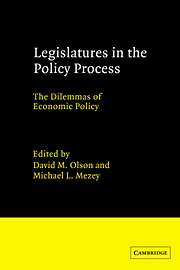Book contents
- Frontmatter
- Contents
- List of contributors
- Preface
- Acknowledgments
- PART I INTRODUCTION
- PART II MACROECONOMIC POLICY
- 2 Legislative oversight of monetary policy in France, Germany, Great Britain, and the United States
- 3 The US Congress and credit policy – institutional and policy implications
- 4 Industrial policy agenda and options in Congress and the executive in the United States
- PART III MICROECONOMIC POLICY
- PART IV CONCLUSION
- Name index
- General index
2 - Legislative oversight of monetary policy in France, Germany, Great Britain, and the United States
Published online by Cambridge University Press: 03 March 2010
- Frontmatter
- Contents
- List of contributors
- Preface
- Acknowledgments
- PART I INTRODUCTION
- PART II MACROECONOMIC POLICY
- 2 Legislative oversight of monetary policy in France, Germany, Great Britain, and the United States
- 3 The US Congress and credit policy – institutional and policy implications
- 4 Industrial policy agenda and options in Congress and the executive in the United States
- PART III MICROECONOMIC POLICY
- PART IV CONCLUSION
- Name index
- General index
Summary
A legislative approach – even one with some built-in leeway – would raise the basic question as to whether the Congress would want to inject itself so directly into these (monetary) judgements, filled with technical complexity and doctrinal controversy. It does not seem to be consistent with the approach taken by Congress in establishing the Federal Reserve System 65 years ago, and consistently adhered to since, that these decisions should emerge from a dispassionate, professional, deliberative process and be shielded from partisan pressures.
Federal Reserve Chairman, Paul Volker (1979)INTRODUCTION
Even the US Congress, the national legislature with probably the greatest independent impact on the formation of economic policy, faces formidable obstacles in its attempt to influence monetary policy. Confronting central bankers, the financial community, economists, presidents, prime ministers, and treasury ministers, legislatures seem far removed from monetary decision-making. Yet with the resurgence of monetary policy in the 1970s and 1980s – its greater visibility and perceived viability in the arsenal of government economic weapons – legislators, too, have taken notice.
Keynesian fiscal policy centering on demand management, viewed by governments as so efficacious in the 1960s, was badly tarnished as an approach to an economic policy by the 1970s. Governments increasingly turned to monetary policy to deal with chronic inflation, sluggish growth, and high unemployment. The four nations included in our study all adopted some form of targeting the growth of the money supply: West Germany in 1974, Britain and France in 1976, and the United States in 1979.
- Type
- Chapter
- Information
- Legislatures in the Policy ProcessThe Dilemmas of Economic Policy, pp. 25 - 58Publisher: Cambridge University PressPrint publication year: 1991



